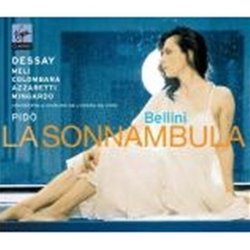| All Artists: Vincenzo Bellini, Evelino Pidò, Orchestre & Choeurs de l'Opera de Lyon, Natalie Dessay, Francesco Meli, Carlo Colombara, Sara Mingardo, Jael Azzaretti, Paul Gay, Gordon Gietz Title: La Sonnambula Members Wishing: 1 Total Copies: 0 Label: Virgin Classics Original Release Date: 1/1/2007 Re-Release Date: 9/25/2007 Genre: Classical Style: Opera & Classical Vocal Number of Discs: 2 SwapaCD Credits: 2 UPC: 094639513826 |
Search - Vincenzo Bellini, Evelino Pidò, Orchestre & Choeurs de l'Opera de Lyon :: La Sonnambula
 | Vincenzo Bellini, Evelino Pidò, Orchestre & Choeurs de l'Opera de Lyon La Sonnambula Genre: Classical
2 CD SET DESSAY/DE L'OPERA DE LYON |
Larger Image |
CD DetailsSynopsis
Product Description 2 CD SET DESSAY/DE L'OPERA DE LYON Similarly Requested CDs
|
CD Reviews"The New Amina" Stanley H. Nemeth | Garden Grove, CA United States | 11/17/2007 (5 out of 5 stars) "I approached listening to this new CD set with some trepidation, for while "La Sonnambula" is an opera of undeniably glorious melodies, these unfortunately are at the service of a frankly silly story. Further, in performance, melodies apart, the opera invariably rises or falls on the strengths of its central singer, the sleepwalker Amina, who stumbles, innocently, into strange men's bedrooms. More specifically, my worry here was over the casting of Natalie Dessay in the title role. While it's true she's a singer of remarkable coloratura gifts, some of her earlier work had convinced me she was of that school of harsh, astringent high voice only the French reportedly prefer. Her performance of "Lucia" on CD, for instance, was to my ears both overacted and undersung, manifestly short on requisite vocal beauty. Therefore, I had doubts whether she could do full justice to this taxing Bellini role which before all others rests on beautiful voice and elegant voice, along with suitably dramatic voice throughout. Happily, my doubts turn out to have been unwarranted. Dessay here makes the role spectacularly her own, turning in one of the most remarkably sung and well-acted Aminas on record. She sings much of the role softly, emphasizing great tonal beauty and dexterity in fioriture, while sparing us any of those blood-curdling high notes which in her "Lucia" could have peeled the paint right off the walls. In my judgment, she joins the stellar company of Callas and Sutherland as a great Bellini interpreter. " Beware the CUTS!!! Peep | Adelaide, AUSTRALIA | 12/04/2007 (2 out of 5 stars) "I don't know what recording the reviewer who states that this has "no cuts" was listening to, but it couldn't have been this one. My heart sank when right from the beginning, half of Lisa's opening aria was cut; this is an outdated and nonsensical practice because it gives the singer no chance to repeat the musical theme and offer his or her personal embellishments. Likewise, in act 2 Lisa had half of her aria "Di lieti auguri" cut - if the singer gets to sing this aria, for heaven's sake, why can't she sing it in full? It's short enough, and in this case the singer wasn't even allowed the luxury of a high B flat at the end. To hear this sung as it should be, listen to Dilber on the Naxos recording - top Fs and all. Continuing on, Elvino's cabaletta was shorn of its second verse, as was the Rodolfo's. Other cuts occurred in the duetting between Amina and Elvino in Act 1. And this is supposed to be a "Critical edition"?? Give me a break. The two stars I give are for Dessay's singing as Amina; she sings quite beautifully, but also a little disappointingly in the cabalettas; "Sovra il sen" abounds with her own individual ornaments, but the whole thing sounds too carefully sung, almost as if she were sight-reading it. And the concluding "Ah! non giunge" is even more disappointing; the critical edition gives the first verse in that stark, simplified edition which Renee Fleming recorded on her Bel Canto album, with the repeat what we are used to hearing as the FIRST verse! So we get none of the fireworks and ornaments that we are used to hearing from Sutherland, Devia, Callas, Peters etc etc. And for those of you who are wondering about the current range of Dessay's voice, she offers nothing above the traditional E flats here; the one closing her first cabaletta is long and exciting, but the one crowning the act 1 finale disappointingly comes in 4 bars later than it should and loses its effect - for real excitement,listen to Sutherland on any of her recordings - even the 1980 one where she is still tons more exciting than Dessay. The tenor here has a lovely plangent voice and offers a few top Cs, but none of the Rubini excursions above; the Lisa is totally forgettable (through no fault of her own, but because of the heinous cuts), and I've already forgotten the Rodolfo and Teresa. Had the performance been complete, I'm sure I would have been a lot more enthusiastic, but as it is...I'll stick with Sutherland any day. An opportunity wasted." A pleasant enough offering S. Wells | California | 12/25/2007 (3 out of 5 stars) "This is a pleasant enough offering, but really no improvement on the competition. Ms Dessay presents a beautifully sung and quite effecting Amina. Her hushed reading of "Ah, non credea mirarti" is especially lovely. Like a previous reviewer, I don't care for the simplified vocal line in the first verse of "Ah, non giunge." The fioratura as printed in the standard edition of the Ricordi vocal score is sung only in the second verse. I've not had a chance to see the critical edition used in this recording, so this may represent Bellini's original intention. But, it just doesn't sound right to me, being accustomed to the runs in both verses of the cabaletta.
Francesco Meli has a larger, darker voice than one usually hears in the role of Elvino. His voice is pleasant and he uses it with taste and intelligence. I simply prefer to hear a sweeter voice in this part. Carlo Colombara and Jael Azzaretti are adequate as Count Rodolfo and Lisa. As pointed out elsewhere, Rodolfo loses the repeat of his first act cabaletta and Lisa loses the repeats of both her first and second act arias. These cuts aren't too surprising as the recording is taken from concert performances given in Lyon. I give this recording only 3 stars because this opera is well represented on CD and there are better performances readily available. The recording on Naxos is half the price and twice as good as this recording. My personal favourite is Joan Sutherland's first commercial recording - her second commercial recording has little to recommend it, alas. The serious collector would not want to be without the live recording from Cologne in 1957 that captures what must have been one of Maria Callas's most spectacular evenings on stage. This set just isn't up to the competition." |

 Track Listings (22) - Disc #1
Track Listings (22) - Disc #1

